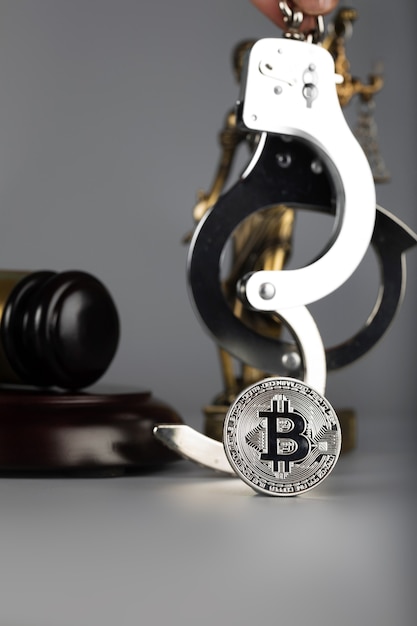SEC Probes Crypto Exchanges: Protecting US Investors?

The SEC (Securities and Exchange Commission) is actively investigating cryptocurrency exchanges to ensure investor protection, scrutinizing their operational practices and compliance with securities laws in the United States.
The world of cryptocurrency trading can be exciting, but it’s also fraught with risks. SEC Investigates Cryptocurrency Exchanges: Investor Protection Measures are more important than ever as digital assets gain mainstream attention, so it’s crucial to understand how the U.S. Securities and Exchange Commission protects investors from scams in the crypto sphere.
SEC Investigates Crypto Exchanges: Why It Matters
Understanding why the Securities and Exchange Commission (SEC) is scrutinizing cryptocurrency exchanges is crucial for anyone involved or interested in the crypto market. These investigations are not arbitrary; they stem from concerns about investor protection and the need to ensure fair and transparent markets.
The SEC’s involvement signals a move toward greater regulatory oversight, which could significantly impact how crypto exchanges operate and how investors interact with these platforms.
Investor Protection Concerns
Investor protection is at the heart of the SEC’s mission. Cryptocurrency exchanges, many of which operate globally, have been criticized for lacking the same safeguards as traditional financial institutions.
This lack of oversight can expose investors to various risks, including fraud, manipulation, and inadequate security measures.
Ensuring Fair Markets
Fairness and transparency are essential for any healthy market. The SEC aims to ensure that cryptocurrency exchanges adhere to the same standards as other regulated exchanges, preventing insider trading, market manipulation, and other illicit activities.
- Fraud Prevention: The SEC seeks to prevent fraudulent schemes that can harm investors.
- Market Transparency: Increased transparency helps investors make informed decisions.
- Regulatory Compliance: Exchanges must comply with securities laws to operate legally.
The SEC’s investigations often focus on whether certain cryptocurrencies should be classified as securities, which would subject exchanges to stricter regulations.

Key Areas of SEC Scrutiny
When the SEC investigates cryptocurrency exchanges, several key areas come under intense scrutiny. These areas are critical for ensuring compliance with securities laws and protecting investors from potential harm.
Knowing what the SEC is looking for can help investors and exchange operators better understand the regulatory landscape.
Listing Practices
The SEC examines how exchanges list digital assets, ensuring that these assets meet certain standards and do not violate securities laws. This includes assessing whether the assets are properly registered and compliant with disclosure requirements.
Trading Practices
Trading practices on cryptocurrency exchanges are closely monitored to prevent market manipulation and ensure fair trading conditions. The SEC looks for evidence of insider trading, wash trading, and other forms of market abuse.
These practices include:
- Market Surveillance: Monitoring trading activity for signs of manipulation.
- Enforcement Actions: Taking action against individuals or entities engaged in illegal trading practices.
- Compliance Programs: Ensuring exchanges have robust compliance programs in place.
The SEC requires exchanges to have robust surveillance mechanisms to detect and prevent such illegal activities.
Impact on Cryptocurrency Exchanges
The SEC’s investigations can have profound effects on cryptocurrency exchanges, influencing their operations, compliance standards, and overall market position. Understanding these impacts is crucial for industry participants.
The consequences of non-compliance can be severe, ranging from hefty fines to operational restrictions.
Increased Compliance Costs
To meet the SEC’s requirements, crypto exchanges often incur significant costs related to compliance. This includes investing in advanced surveillance technology, hiring compliance experts, and implementing rigorous internal controls.
Enhanced Regulatory Oversight
Increased regulatory oversight can lead to greater transparency and accountability in the crypto market. This can foster trust among investors and promote long-term market stability.

Legal and Reputational Risks
Exchanges found to be in violation of securities laws face significant legal and reputational risks. These can include fines, penalties, and damage to their reputation, which can erode investor confidence.
The SEC’s enforcement actions can serve as a deterrent, encouraging other exchanges to prioritize compliance and investor protection.
Measures for Investor Protection
Investor protection is a cornerstone of the SEC’s regulatory efforts. Several measures are in place to safeguard investors in the cryptocurrency market, including disclosure requirements, registration rules, and enforcement actions.
These measures aim to create a safer and more transparent investment environment.
Disclosure Requirements
Disclosure requirements ensure that investors have access to accurate and comprehensive information about crypto assets and exchanges. This includes financial statements, risk disclosures, and information about the exchange’s operations.
Registration Rules
Registration rules require cryptocurrency exchanges to register with the SEC if they are dealing in securities. This allows the SEC to oversee their operations and ensure compliance with securities laws.
Key elements of these rules include:
- Compliance Audits: Regular audits to verify compliance with regulations.
- Reporting Obligations: Requirements to report financial and operational information to the SEC.
- Legal Framework: Establishing a clear legal framework for crypto exchanges.
By registering, exchanges agree to adhere to the SEC’s standards, providing a layer of protection for investors.
How Investors Can Protect Themselves
While the SEC plays a vital role in investor protection, individual investors also have a responsibility to protect themselves. There are several steps investors can take to minimize their risks in the cryptocurrency market.
Being informed and cautious is key to navigating the crypto landscape safely.
Due Diligence
Before investing in any cryptocurrency or using a particular exchange, investors should conduct thorough due diligence. This includes researching the asset, understanding the exchange’s policies, and assessing the associated risks.
Diversification
Diversifying investments can help reduce risk. Instead of putting all their funds into a single cryptocurrency or exchange, investors should spread their investments across multiple assets and platforms.
Staying Informed
Keeping up-to-date with the latest news and developments in the crypto market is essential. This includes monitoring regulatory changes, industry trends, and potential risks.
Staying informed can also help investors recognize and avoid scams and fraudulent schemes.
Future of Cryptocurrency Regulation
The future of cryptocurrency regulation in the U.S. remains uncertain, but it is clear that the SEC will continue to play a significant role in shaping the market. Increased regulatory clarity and enforcement are likely to be key themes.
Balancing innovation with investor protection will be a central challenge for regulators.
Potential Regulatory Changes
Several potential regulatory changes could impact the cryptocurrency market in the coming years. These include new rules for crypto exchanges, clearer definitions of what constitutes a security, and increased enforcement against illegal activities.
Global Regulatory Coordination
Given the global nature of cryptocurrency, international regulatory coordination will be crucial. The SEC is likely to work with other regulatory bodies around the world to develop consistent standards and enforcement mechanisms.
- Cross-Border Cooperation: Collaborating with international regulators.
- Standardized Regulations: Developing uniform rules.
- Information Sharing: Exchanging information to combat illicit activities.
Such coordination can help prevent regulatory arbitrage and ensure a level playing field for crypto exchanges.
| Key Point | Brief Description |
|---|---|
| 🛡️ Investor Protection | The SEC’s main goal is to protect investors from fraud and manipulation in the crypto market. |
| 🔍 SEC Scrutiny | The SEC focuses on listing and trading practices, ensuring exchanges comply with securities laws. |
| ⚖️ Regulatory Impact | Compliance costs increase, leading to stricter oversight and potential legal risks for exchanges. |
| 💡 Investor Actions | Investors should perform due diligence, diversify, and stay informed to protect themselves. |
Frequently Asked Questions (FAQ)
▼
The SEC investigates crypto exchanges to protect investors, ensure fair markets, and verify compliance with securities laws. These investigations aim to prevent fraud and manipulation in the cryptocurrency market.
▼
The SEC scrutinizes listing practices, trading practices, and compliance programs on cryptocurrency exchanges. They ensure assets meet standards and prevent insider trading and market manipulation.
▼
SEC scrutiny leads to increased compliance costs, enhanced regulatory oversight, and potential legal and reputational risks for crypto exchanges. Exchanges must invest in surveillance and compliance measures.
▼
Investor protection measures include disclosure requirements, registration rules, and enforcement actions. These ensure investors have accurate information and exchanges comply with securities laws.
▼
Crypto investors can protect themselves by conducting due diligence, diversifying their investments, and staying informed about market developments and regulatory changes. This helps minimize risk and avoid scams.
Conclusion
The SEC’s investigations into cryptocurrency exchanges highlight the importance of investor protection and regulatory compliance in the digital asset market. As the regulatory landscape evolves, understanding these measures and potential impacts is crucial for both exchanges and investors.
